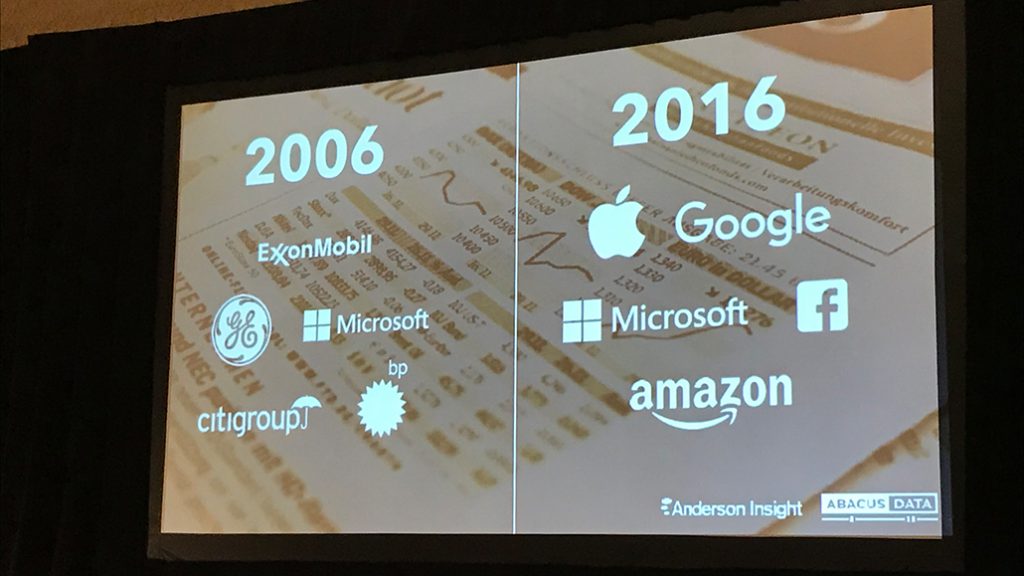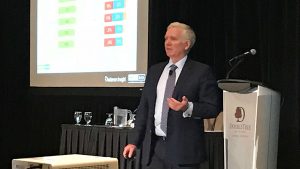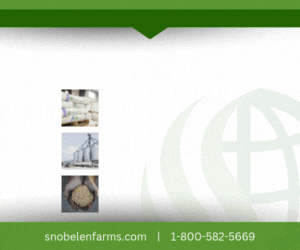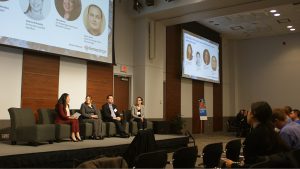Political change
VOTER ENGAGEMENT IN THE 2018 PROVINCIAL ELECTION

CHANGES IN OUR society, how we see ourselves in the world, and the expectations we have for the future will all play a role in the outcome of the 2018 provincial election.
“This is an incredibly dynamic provincial campaign, maybe one of the most interesting ones we’ve seen in a long time,” says Bruce Anderson, the chairman of polling firm Abacus Data and a public affairs consultant and commentator. He spoke with Grain Farmers of Ontario delegates at their semi-annual meeting.
He says the way we think about the economy has shifted from one that was gauged on how well the auto sector was doing to now being influenced by the technology sector.

“Google, Microsoft, Facebook, Amazon aren’t speculative, they are making lots of money and they are growing their businesses. They are among the most successful companies in the world by any measure. And what’s really important about that is if you are an under 40 voter, this is the corporate economy of the future as you see it,” says Anderson.
Millennials will be the single largest block of voters eligible to cast their ballot in the provincial election and voter turnout within their demographic is increasing. Anderson says this could be a challenge for the Conservatives.
“Conservatives have a challenge to develop a platform that resonates with younger voters and also stays in touch with the older demographic that is their base. Historically, younger voters have sided with the NDP and the Liberals.”
He says for millennials, debt, and fiscal issues are taking a back seat to dental care, health care, and cost of living issues.
FOOD AND FARMING
Agriculture is also being affected by this shifting demographic.
“Important changes are going on with our relationship with food and agriculture – it’s partly generation driven, and partly information driven,” says Anderson. “When we want to know anything we can ask our phone or type something into a device. And when it comes to food, people really want to know a lot more than they used to.”
Anderson’s polling shows that 89% of people feel well served with healthy food choices; and despite the push to label food with additional nutrition information, consumers feel they have other ways to access that information if they want it. Seventy per cent of consumers also say they are ok with food prices. Cost of living is an issue – but people are more concerned about the cost of electricity and housing than they are with the cost of their food. In fact, more than half are willing to pay more for what they perceive as being a better option.
“People like their food, they are interested in it more, and one of the things that is going alongside that is they are more interested in farming and famers and what do farmers think. And we’ve found that right now, 65 per cent say they would prefer to buy their food from local farmers and farmers markets,” says Anderson.
He adds that nearly 30 per cent of people say they have made a specific effort to buy more local fruit and vegetables in the past year.
“They have an intention, and their intention is guided by a feeling that when you are dealing with a local farmer you are making a wiser choice from either an economical or health standpoint or that you are making a choice that you feel better about in terms of what it says about you.”
POLITICAL INFLUENCE
Anderson also says people have a broader world view than in the past, but we aren’t so concerned about what others think of us as we feel we can hold our own and have much to offer our international partners. Not surprisingly, the biggest influence on politics in Canada recently has been the Donald Trump story. Anderson’s monthly polling shows that Canadian issues are taking a back seat to what’s happening south of the border. Politicians can’t be indifferent to what’s happening there – particularly when it comes to tariffs, trade agreements, and defense discussions.
Politicians also can’t ignore how Trump changed the way elections are won or lost. According to Anderson, simply buying advertising on TV doesn’t work anymore.
“We know that how people consume information about politics and politicians has shifted towards social media, towards word of mouth,” says Anderson.
This shift has made it more difficult to predict the outcome of an election campaign. Snap decisions are often made by voters who engage in the election process late in a campaign. And the real wild card is who is actually going to show up to vote.
“When people ask why are polls so inaccurate, the biggest reason is who turns out to vote – the science isn’t very reliable anymore,” explains Anderson. “We used to have very stable turnout rates in Canada, then they started dropping. It used to be everyone got their news the same way – through television or the newspaper, and now we get it through Facebook or Twitter or our Friends. So figuring out who is actually going to turn out is incredibly difficult.”
Anderson says most Ontarians would prefer a change in government and the Conservatives are favoured to win the election; but at the start of the election period, his polling didn’t indicate numbers that would guarantee a win. He says it’s possible the NDP could have a stronger showing than some expect.
“There never is enough data to support a surprise outcome until the surprise outcome happens,” Anderson says.
That’s why it’s important that everyone who can vote, gets to the polls on election day.
“We all have a responsibility as citizens to encourage our friends and neighbours and family members to think carefully about the issues, to think carefully about the choices, to go out and vote, and to tell others to do the same.” •


















